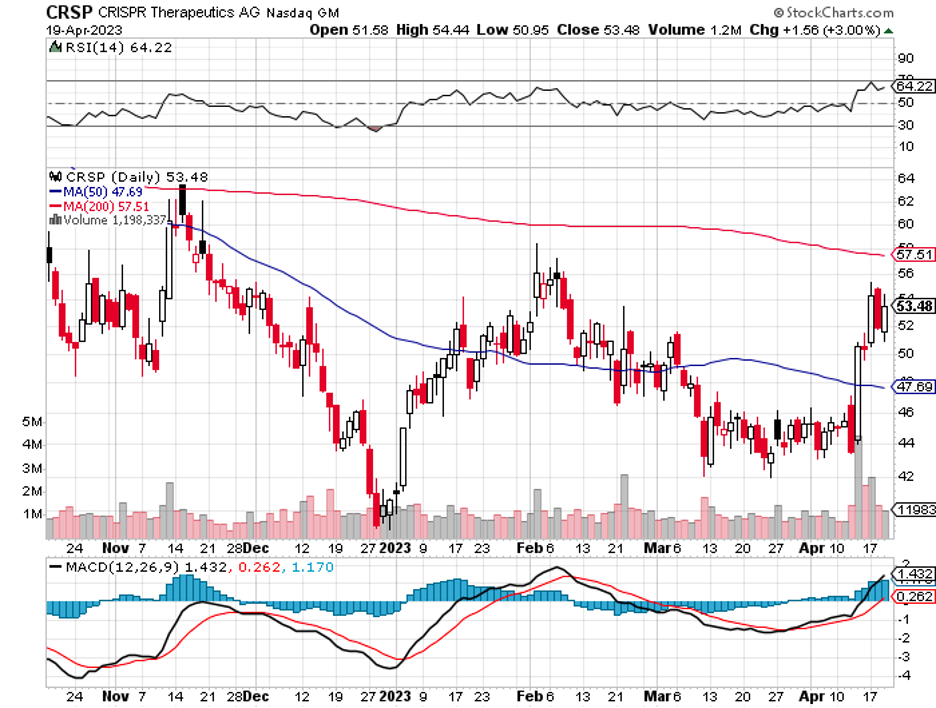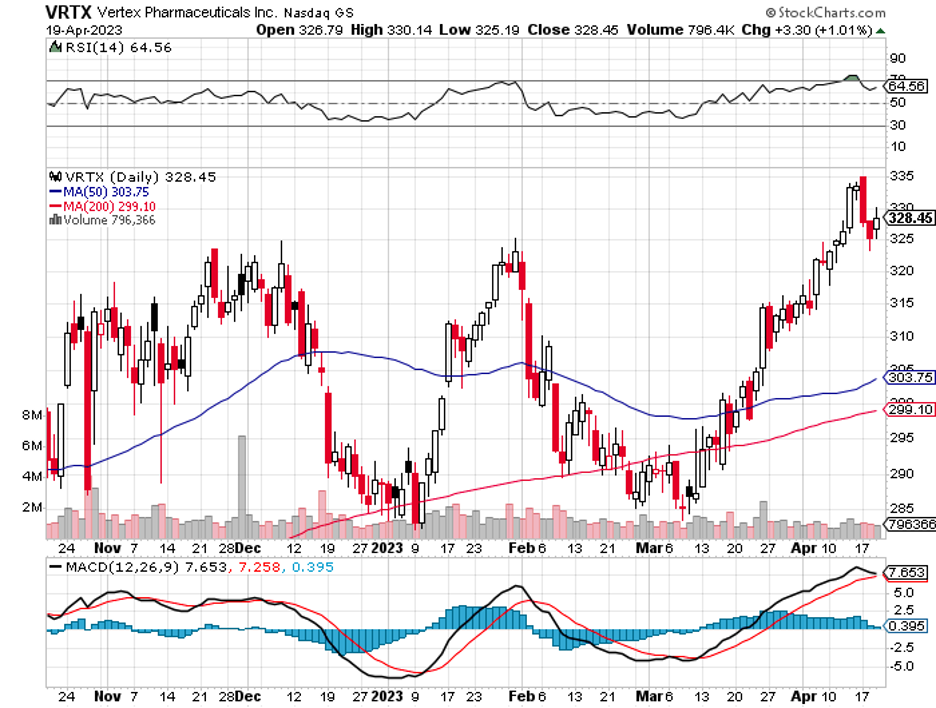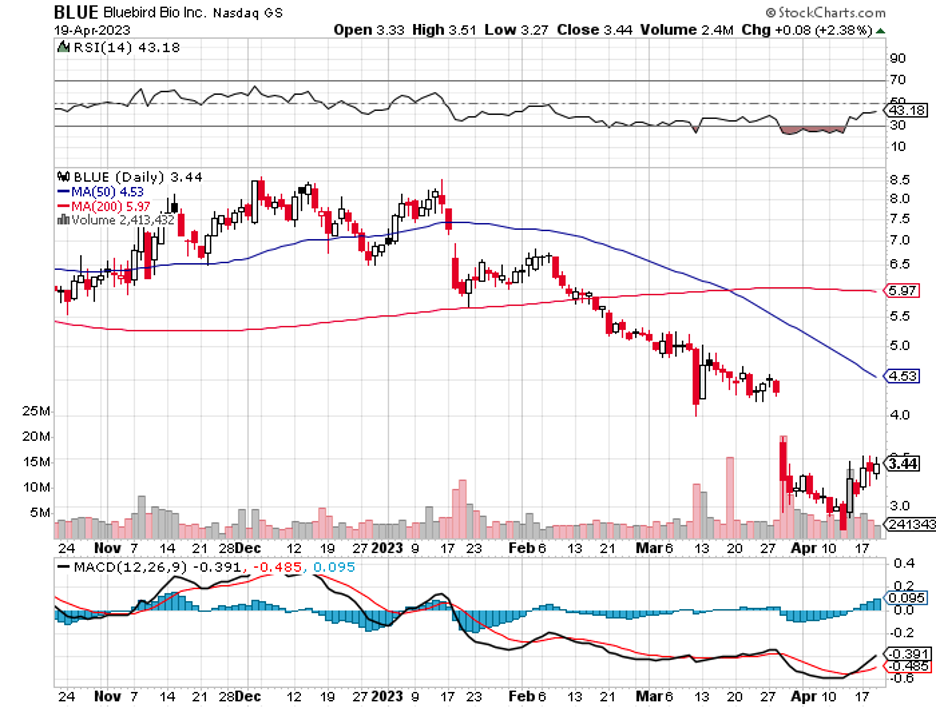Another Ride in Biotech
The biotech industry is a rollercoaster of investment opportunities, where great successes and flops can easily be the difference between riches or ruin.
Companies like Moderna (MRNA) have seen this firsthand - going from a $4 billion valuation to nearly 15-fold that amount in just one successful drug launch resulting from their COVID vaccine development program. To rekindle investor interest in what may seem like an erratic space, giants such as Merck (MRK) are also putting money into promising companies; with its recent acquisition of Prometheus Biosciences (RXDX) evidence enough that even long-established pharmas recognize the potential rewards available within biotechnology markets.
Investors seeking the next big win in biotech should look beyond household names for potential gems.
Take CRISPR Therapeutics (CRSP), whose collaboration with Vertex Pharmaceuticals (VRTX) is taking exa-cel to new heights, and Bluebird Bio's (BLUE) progress on lovo-cel as just two examples of lesser-known science ahead of its time that could pay off handsomely in your portfolio.
Recent news shows that two upcoming treatments for sickle cell disease, exa-cel and lovo-cel, could be cost-effective if priced below $1.9 million - a figure the Institute of Clinical and Economic Review (ICER) concluded after conducting an extensive assessment of their financial aspects. Momentum is building as both companies aim to secure FDA approval soon; investor optimism in CRISPR continues to grow increasingly evident due to this good news.
Here’s a quick recap of the treatment’s market opportunity.
Sickle cell disease and thalassemia patients face a hefty financial burden over their lifetime, with disease-related expenses ranging from $4 million to $6 million.
As a gene-editing therapy, exa-cel is a complex treatment to manufacture and administer, which further justifies its potentially high price tag. With this innovative therapy, Vertex Pharmaceuticals and CRISPR Therapeutics aim to target 32,000 sickle cell disease (SCD) and thalassemia (TDT) patients in the United States and Europe, emphasizing the significant market opportunity for the companies.
The potential market for exa-cel, assuming a price point of $2 million, amounts to a staggering $64 billion opportunity.
While this price tag may seem steep, it is not unprecedented in the industry. Bluebird Bio, for instance, secured approval for its gene-editing medicine Zynteglo last year, pricing it at $2.8 million.
The question remains whether third-party payers will be willing to cover the high costs associated with these treatments. Case in point – Bluebird Bio exited the European market after being unable to secure favorable deals with third-party payers. As such, how exa-cel will fare in this challenging reimbursement environment is yet to be determined.
As CRISPR Therapeutics and Vertex Pharmaceuticals chart their path for the launch of exa-cel, they are keenly aware that pricing gene editing therapies rightly is critical.
Both companies have been in active dialogue with insurance providers and governmental programs like Medicaid to ensure this goal comes to fruition. Even if it means accepting modest prices for its product, there's still immense potential for exa-cel due to the lack of existing treatments meeting SCD and TDT patients' needs.
Given these details, where does CRISPR currently stand?
Investing in clinical-stage biotech stocks can be a tricky, with the potential rewards marred by the risks of what still lies ahead. However, for those brave enough to take on this challenge, there's an astronomical market opportunity at stake—the CRISPR Therapeutics and Vertex Pharmaceuticals tag team are vying against formidable foes like Bluebird’s Zynteglo as well as lovo-cel, one that could transform how SCD gene editing is treated if approved soon by FDA.
With a bigger war chest, however, Vertex may have an edge in the race, but CRISPR is no slouch, with an agreement in place to retain 40% of exa-cel's profits. It remains to be seen who will come out on top remains to be seen, but the potential rewards are undeniably huge.
As investors eagerly await the approval of exa-cel, CRISPR Therapeutics' promising gene-editing therapy for sickle cell disease, the company's market capitalization may not reflect the therapy's massive potential.
Assuming that exa-cel delivers and truly becomes a multi-billion-dollar opportunity, CRISPR Therapeutics and Vertex Pharmaceuticals are poised to capture a significant market share with their forthcoming therapies. With the advantage of a stronger cash position, Vertex could push the scales in its favor, helping with the therapies' launch.
Even conservatively assuming profits of $12 billion, CRISPR Therapeutics' market cap of $3.6 billion does not do justice to the company's potential.
While it's still early days, CRISPR Therapeutics' other promising programs should not be ignored. The company is somewhat fairly valued, but exa-cel's approval could send its shares soaring.
Beyond the financial benefits, the success of exa-cel could also bolster CRISPR Therapeutics' position as a leader in gene editing technology.
The company's pipeline includes promising programs in immuno-oncology and rare diseases, and the sustained revenue generated by exa-cel could fuel further research and development efforts. This bodes well for the stock's prospects, as CRISPR Therapeutics continues to advance the frontiers of innovative medicine.
Meanwhile, another possibility for CRISPR is a buyout.
The gene-editing market may be small, but its rapid growth rate of nearly 30% until 2030 presents an enticing opportunity for healthcare businesses to pursue. The market is estimated to reach less than $15 billion by then. With an approved gene-editing therapy, CRISPR Therapeutics could be a valuable asset for a larger healthcare company seeking growth.
At a market cap of less than $4 billion, CRISPR Therapeutics is an affordable acquisition for a top healthcare company looking to expand its portfolio. The company's favorable balance sheet, with over $1.8 billion in cash and short-term investments and modest debt of just over $244 million, makes it even more appealing as a potential acquisition.
The acquisition of CRISPR's business wouldn't come with a lot of headaches, and it could instantly boost a company's growth prospects.
With the sustained revenue from exa-cel and the potential for more clinical and regulatory wins in its other programs, CRISPR Therapeutics' gene-editing pipeline is worth considering for any healthcare business looking to capitalize on the promising growth opportunities in this market.
Overall, the potential for significant upside in the short and mid-term, combined with the company's pioneering spirit, makes CRISPR Therapeutics an attractive investment opportunity for discerning investors.




